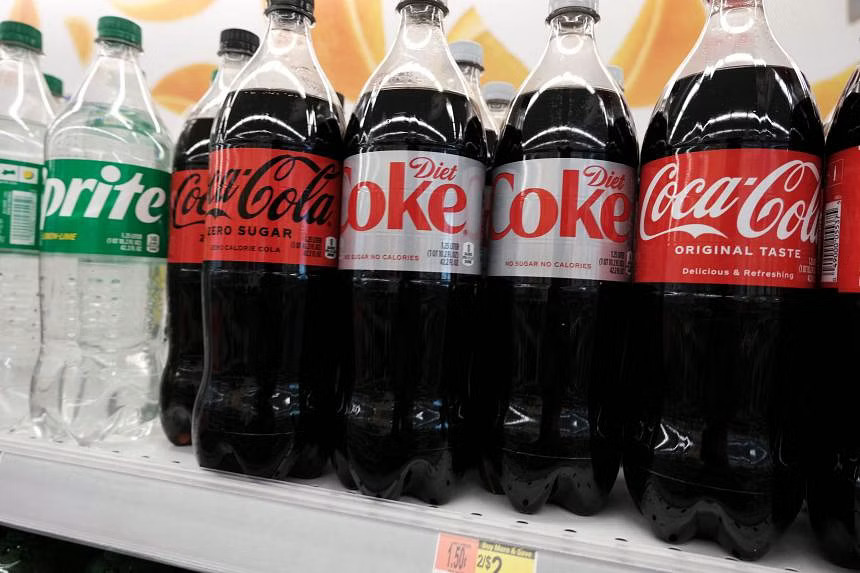FDA rebukes WHO’s report
NEW YORK (ANN)THE STRAITS TIMES) – As customers raised concerns about possible health risks linked to aspartame, PepsiCo decided to remove the artificial sweetening ingredient from its popular diet soda.
This was about eight years ago, causing sales to flop, however, aspartame was back in Diet Pepsi a year later.
Today, the top three ingredients listed in the tiny print on the backs of cans and bottles of Diet Pepsi – and on its competitor Diet Coke – are water, caramel colour and aspartame.
A trip through the grocery store reveals the ingredient on the labels of not only diet sodas but diet teas, sugar-free gums, sugar-free energy drinks and diet lemonade drink mix. By some estimates, thousands of products contain aspartame.
The use of aspartame, often known by the brand name Equal, in food and beverage products has long been scrutinised.
The latest iteration came Thursday, when an agency of the World Health Organization (WHO) declared that aspartame could possibly cause cancer and encouraged people who consume a significant number of beverages with aspartame to switch to water or other unsweetened drinks.
But even with the emergence of many new artificial sweeteners, as well as those that are plant- and fruit-based, Big Food just cannot quit aspartame, and analysts do not expect it to this time.
That is because the ingredient is one of the least-expensive sugar alternatives to use, it works especially well in beverages and mixes, and people like the way it tastes.
There was also pushback about the urgency of the WHO’s announcement.
In a quick rebuke, the United States’ Food and Drug Administration (FDA) said it disagreed with the findings, reiterating its stance that aspartame is safe. And a second WHO committee said a 68 kilogramme person would need to drink more than a dozen cans of Diet Coke a day to exceed the safe threshold for the sweetener.
“The big beverage companies have been doing contingency planning for months, experimenting with different sweeteners, with a goal of having the taste and quality of the diet beverages being as consistent as possible with existing products,” said Garrett Nelson, who covers the beverage industry at CFRA Research.
But they are not likely to change the recipe unless they see a significant drop in consumer demand based on the WHO report, he said.
“If consumers really stop buying Diet Coke because of this report, if sales start to suffer, it might be time to go to plan B,” Nelson added.
Coca-Cola referred questions to the American Beverage Association, the lobbying arm for the industry.
“Aspartame is safe,” Kevin Keane, interim president of the organisation, said in a statement.
PepsiCo did not respond to questions for comment, but in an interview with Bloomberg Markets that aired Thursday, Chief Financial Officer Hugh Johnston said he did not expect a big consumer reaction.
“I do believe that, in fact, this is not going to be a significant issue with consumers based on just the preponderance of evidence that suggests aspartame is safe,” Johnston said.
The assessment of the WHO agency adds to consumer confusion around aspartame, but it is also the latest in a recent spate of research focusing on the potential risks and questioning the true benefits of artificial sweeteners.
Just a few weeks ago, the WHO advised against using artificial sweeteners for weight control, saying a review of studies did not show long-term benefit in reducing body fat in children or adults. The review also suggested that the sweeteners were tied to an increased risk of Type 2 diabetes and cardiovascular diseases.
This year, researchers at North Carolina State University and the University of North Carolina at Chapel Hill released a study that found a chemical formed after digesting another sweetener, sucralose, breaks up DNA and may contribute to health problems.
Most food and beverage companies that use aspartame are reluctant to switch partly because aspartame is less expensive than other alternatives and is 200 times as sweet as sugar, meaning a little goes a very long way.
On top of that, the FDA approved aspartame in 1974, giving companies decades of data and information on what aspartame can and cannot do in products.
Food and beverage companies are releasing new no- or low-sugar products in response to consumer demand, but many are being made with either newer sweeteners or a blend of sweeteners. Each new product undergoes a litany of sensory and flavour tests before it is released.
But for products that have been around for decades, such as diet sodas, loyal customers are accustomed to a specific taste, and they could be turned off by changes in ingredients, scientists say.





